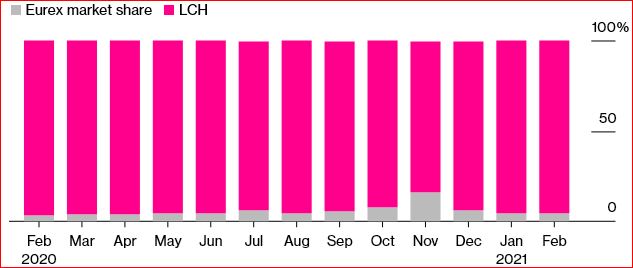Dutch professor estimates cost of fragmentation of clearing; Permission for cross-border clearing expires in June next year
One of the biggest Brexit battlegrounds between the European Union
and the U.K. now has a price tag: at least $2.4 million a day.
That’s
how much any move by the European Union to cut off access to London’s
dominant clearinghouses for derivatives could cost traders in euro
interest rate swaps, net of buying, according to an estimate from Albert
Menkveld, professor of finance at Vrije Universiteit Amsterdam, who has
sat on advisory panels to European regulatory authorities.
Fragmenting cross-Channel clearing would
result in additional costs because global dealers would need more
collateral for their positions in multiple clearinghouses in the U.K.
and in the EU, Menkveld said. They wouldn’t be able to offset, or net,
the positions as easily and that would require dealers to raise extra
funds.
Those additional costs would likely be passed
on to pensions, money managers and other users of derivatives in the
local jurisdiction, Menkveld said, who compares the burden on financial
markets to traffic jams caused by passport controls.
“This is the price we all paid for control by national authorities,” Menkveld wrote in a blog post.
“As a European citizen I can now zip onto the Autobahn at 100-plus
kilometers per hour, but my pension fund might soon pay for crossing the
border with the U.K. to diversify risk.”
His tally is one of the first to show the
immediate fallout if authorities stop the seamless, cross-Channel
settlement of trillions in euro interest rate swap contracts, which
currently takes place largely in London. The actual cost could be far
greater if it weakens London’s attractiveness as a global financial
center. The business is widely viewed as a core pillar of London’s
standing and the EU’s desire to pull more of that business away has
prompted sabre-rattling from politicians, financiers and even the governor of the Bank of England.
The
U.K. and major lobby groups for the biggest banks and money managers in
the world are calling for the EU to maintain easy access to London
clearinghouses, including the London Stock Exchange Group Plc’s
LCH unit which is the world’s biggest for euro interest rate swaps. The
European Commission in Brussels wants the bloc’s traders to move more
of their euro-denominated business inside the EU and not rely so heavily
on London. A ruling last year extended access to London through June
2022.
Clearing Prize
London's LCH clearinghouse dominates euro interest rate swap market

Source: Clarus Financial Technology
Clearinghouses serve as a key hub in
the global financial system, settling hundreds of trillions of dollars
in deals between banks, hedge funds, pensions and a wide range of
corporations. The firms collect collateral, or margin, from buyers and
sellers to reduce the risk that the default of one side spreads panic to
the other and, in turn, across the broader system.
If the temporary decision isn’t renewed, Bank
of England Governor Andrew Bailey has said a quarter of
euro-derivatives clearing business would need to shift to the EU. The
rest would likely stay in London because it is currently the most
efficient place for it, he said....
more at Bloomberg
© Bloomberg
Key

Hover over the blue highlighted
text to view the acronym meaning

Hover
over these icons for more information

Comments:
No Comments for this Article